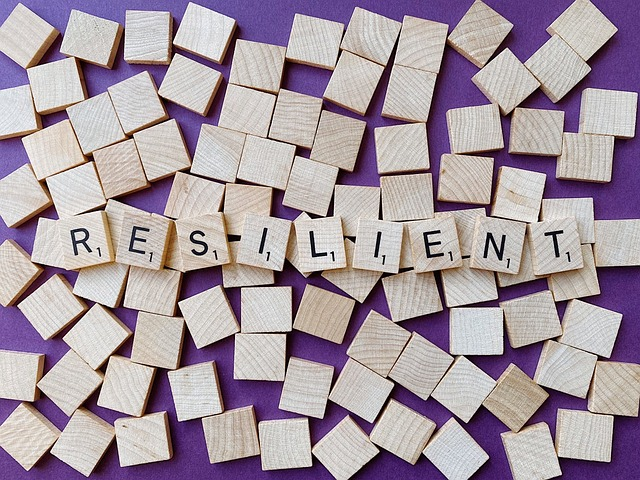Resilient Stories is a place where you can learn how to be more resilient. The world often makes us feel like we go through hardship alone. Isolation can lead to depression and lessen our ability to bounce back.
However, when we realize that there are others out there who have faced similar (or even far worse) challenges as us, we no longer feel alone but connected. Connected to something grounding, hopeful, supportive, and inspiring.
This connection helps us cultivate more resilience for ourselves.
Some people seem to be more naturally resilient than others, but it is a skill! The more someone practices and follows the principles of resiliency, the more capable they become at knowing and doing what it takes to be resilient.
Words We Associate With Being Resilient

The word resilience (noun) comes from Resile, has been used in the English language since the 1500s.
According to the Oxford Advanced American Dictionary, resilient means- ‘leaping back,’ from the latin verb resilire ‘to recoil,’ from re- ‘back’ + salire ‘to jump.’
The word resilience, as we use it today, relating to people or animals, is ‘the ability to withstand or recover quickly from difficult conditions.’
If you are talking about an object, you could say that being resilient means being able to recoil or spring back into shape after being bent, stretched, or compressed.
We can also apply that to people and think of it as a person’s ability to adapt to difficult situations.
There are several words that come to mind when we say someone is resilient. They include toughness, perseverance, grit, courage, capability, strength, and so on.
When a person is in the middle of a struggle or hardship, they can feel like they will never get back to themselves (or their ‘original shape’).
And let’s face it: life is a series of situations that can require a person to become remarkably resilient in order to come out on the other side. But if they can demonstrate the qualities of any of the words listed above, that speaks to how resilient they are in life.
You Are Inherently Resilient
Everyone has their own examples of personal resilience. Many adult people are dealing with the trauma they went through as children. Or maybe it was shock from a sudden tragic loss.
Nearly everyone has experienced something in life that left them shattered or profoundly changed them. Even if you don’t think you ever went through trauma, but sometimes life just keeps knocking you down and feels really hard, then you have proved resilient!
What Does the Research Say About Why Resilience Is Important?
Resilience helps us overcome emotional and physical traumas. It also aids us in using our skills and abilities to overcome challenges. People with little resilience tend to be easily overwhelmed and can appear helpless.
This lack of resilience often manifests as avoidance, isolation, or self-medication. Researchers have shown that people who have strong coping abilities (like resilience) are much more likely to be happier and have greater health outcomes.
Traits, Qualities, and Characteristics of the Resilient Person

Interestingly, we actually have data on the common characteristics of resilient people. This is thanks to The Connor-Davidson Resilience Scale (CD-RISC).
The Connor–Davidson Resilience Scale was developed by Kathryn M. Connor and Jonathan R.T. Davidson as a means of assessing resilience. The (CD-RISC) is a self-rated assessment of stress-coping ability and was developed based on concepts of hardiness, adaptation, and stress endurance.
The questionnaire presents 25 elements for subjects to evaluate themselves on using a five-point Likert scale: 0- not true at all, 1- rarely true, 2- sometimes true, 3- often true, and 4- true nearly all of the time.
These ratings result in a number between 0–100, and higher scores indicate higher resilience.
After studying their data, Connor and Davidson concluded that the research shows five factors that influence a person’s resilience:
- Personal competence, high standards, and tenacity
- Trust in one’s instincts, tolerance of negative affect, and strengthening effects of stress
- Positive acceptance of change and secure relationships
- Control
- Spiritual influences
The scale also demonstrated that resilience is modifiable and can improve with treatment. Some people have less resilience than others, but it can be developed over time.
Resilience may be viewed as a measure of stress-coping ability and, as such, could be an important target of treatment for anxiety, depression, and stress reactions.
What Is Resilient Behavior?

There are a number of types of challenges we overcome in life. Most of us have dealt with personal crises, including illness and loss. There are common realities in the news, such as terror attacks, mass shootings, and disasters.
And, of course, the pandemic. As humans, we are literally working through difficulties all the time.
Resilience theory explains the ways in which people react in challenging situations. Situations like big changes, losses, or great risks. Resilience theory can be applied to many areas of study, like psychiatry, human development, and change management.
Ultimately, resilience theory looks at behavior and argues that it’s not the nature of adversity that is most important but how we deal with it.
Resiliency is the ability to overcome any kind of obstacle or failure, and resilient behaviors are numerous. Examples would be things like looking at a bad situation as troubling or temporary.
Changing your perspective, or “reframing,” is another good example of resilient behavior.
Some Behaviors of Resilient People

Resilient behaviors rely on the healthy habit of good self-management. These tips are simple, but each one is important to good coping strategies and building resilience.
Resilient Behavior #1: Taking a Step Back
Sometimes, something difficult happens, and we have no immediate idea how we are going to handle the situation. We have emotional overload, and our perspective becomes narrowed. Taking a step back to look at ourselves, outside of the situation on its own, is critical to resilience.
Often referred to as emotional distancing, the technique asks us to look to objectively at something from the outside, as if it were happening to someone else and not us.
When we stop using negative circumstances to define ourselves, we can often see the bigger picture and more easily develop strategies to change them.
Resilient Behavior #2: Reframe Negative Thoughts
Resilient people can look at bad situations realistically and not focus on anger or blame. Instead of looking at adversity with dread or desperation, they focus on forward motion and try to find the easiest way to solve the problem.
Focusing on the positives helps break down negative thoughts and allows for more awareness of possible solutions or opportunities.
Resilient Behavior #3: Social Connection
One of the best ways to boost well-being is through quality social relationships. When we are stressed or anxious, it can be very beneficial to have others we can talk to who understand and have gone through similar experiences.
Having a shoulder for crying or listening ears can be of enormous value. Resilient behavior includes making quality connections and time spent with others a priority.
Develop Resilience & Coping Skills

Building resilience can be challenging, but it can also be a journey of personal growth. There is no universal formula for improving resilience; several factors contribute to strengthening our coping skills.
Resilience develops over time as well and can be a product of how long you’ve lived and what you’ve endured in life. Young people, you might say, are more inclined to innate resiliency, while older people develop learned resiliency.
Below are some key components of resiliency. If you make an effort to work on these things, you will build your resilience to face all obstacles that come your way.
Resilience Means Self-Knowledge
It is critical that one learn how to be resilient, and to do that, you must know yourself. If we aren’t able to cope adequately with stress, we are likely not to survive.
Sometimes, we may use drugs, alcohol, or other unhealthy coping mechanisms to cope when we feel sad, only to find we ultimately feel worse.
By developing a sense of self-awareness, or self-knowledge, we can be more thoughtful about what we need, which helps improve our resilience in the event of an unexpected crisis.
One of the most undervalued ways that we can grow personally is simply by focusing more on ourselves. An awareness of our beliefs, values, and goals fortifies our resolve and allows us to make choices that serve us positively during tough times.
To develop more self-awareness, try mindfulness practices like meditation.

Resilience Means Work-Life Balance
Burnouts occur in people who experience mental stress. Research argues that burnout can occur through too much work, lack of control, and lack of money and may cause mental stress, anxiety, and a lack of motivation.
Workplace burnout is more common today than ever before, so it’s imperative to build resilience against these stressors. Maintaining a work-life balance is crucial to good mental health and allows us to build our resiliency through giving time to our purpose or passions.
Resilience Means Making Meaning From Hardship
Human instinct is to understand the difficulties we encounter. In the event of hardship, like death or loss or critical stress, we often develop explanations for what happened and why.
Sometimes, this can take years, but eventually, we come to find meaning in particularly negative experiences. This is how meaning can contribute to resilience. Finding meaning helps us accept how the event might have changed us and how we’re better off for it.
Resilience Means Setting Long-Term Goals
Goal setting assists in developing resilience because goals act as anchors and guides. With good goals in mind, when the situation gets tough, we can look at the objective.
Part of being resilient means overcoming obstacles and not being pulled off track. If the goal is unclear, then it is very easy for people to be pushed off course.
Perspective is the Most Important of the Resilience Skills
Reality is more than simply what happens to us; it is also how we interpret what happens. Perspective has the power to change our attitude, which can, in turn, change our circumstances.
In the list of skills required to be resilient, the ability to change your perspective is at the top. When you have enough self-awareness to notice your thoughts and decide if they are serving you or not, you literally take control of your own life.
Knowing when you need to change your thinking is invaluable in building resilience.
What Is the Meaning of Resilience to You?

Tell me, what is your definition of resilience? What does it mean to be a resilient person?
Resilience means adaptability to a difficult situation, especially stressful circumstances, adversity, or trauma.
Calling someone resilient is the same as saying they are mentally strong, emotionally tough, courageous, or have perseverance and grit. It is also meant to describe the mental reservoir that assists the individual in dealing with stress and hardship.
Think about the significance of resilience in your life. If you define resilience in detail, you will be more able to understand how you cope with stress and how to choose the strategies that are most beneficial for your situation.
Tell us your definition of resilience in the comment section!





























0 Comments